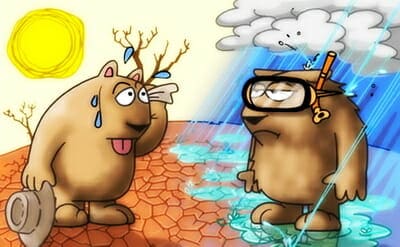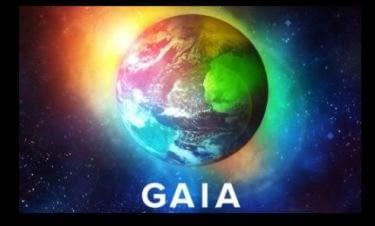- Nature is more powerful than the computer models… “It’s only got to take one sizable volcano to erupt and all the models, everything else, is right off the board” (BREITBART)
- “…we should give up on saving the planet” (video below)
This comes from THE GUARDIAN by way of CLIMATE DEPOT:
James Lovelock’s parting words last time we met were: “Enjoy life while you can. Because if you’re lucky, it’s going to be 20 years before it hits the fan.” It was early 2008, and the distinguished scientist was predicting imminent and irreversible global warming, which would soon make large parts of the planet uninhabitably hot or put them underwater. The fashionable hope that windfarms or recycling could prevent global famine and mass migration was, he assured me, a fantasy; it was too late for ethical consumption to save us. Before the end of this century, 80% of the world’s population would be wiped out.
His predictions were not easy to forget or dismiss. Sometimes described as a futurist, Lovelock has been Britain’s leading independent scientist for more than 50 years. His Gaia hypothesis, which contends that the earth is a single, self-regulating organism, is now accepted as the founding principle of most climate science, and his invention of a device to detect CFCs helped identify the hole in the ozone layer. A defiant generalist in an era of increasingly specialised study, and a mischievous provocateur, Lovelock is regarded by many as a scientific genius.
[….]
What has changed dramatically, however, is his position on climate change. He now says: “Anyone who tries to predict more than five to 10 years is a bit of an idiot, because so many things can change unexpectedly.” But isn’t that exactly what he did last time we met? “I know,” he grins teasingly. “But I’ve grown up a bit since then.”
Lovelock now believes that “CO2 is going up, but nowhere near as fast as they thought it would. The computer models just weren’t reliable. In fact,” he goes on breezily, “I’m not sure the whole thing isn’t crazy, this climate change. You’ve only got to look at Singapore. It’s two-and-a-half times higher than the worst-case scenario for climate change, and it’s one of the most desirable cities in the world to live in.”
There are various possible explanations for his change of heart. One is that Lovelock is right, and the models on which his former predictions were based were fatally flawed. Another is that his iconoclastic sensibility made revision irresistible. An incorrigible subversive, Lovelock was warning the world about climate change for decades before it began to pay attention, and just when the scientific consensus began to call for intervention to prevent it, he decided we were already too late. But there is a third explanation for why he has shifted his position again, and nowadays feels “laid back about climate change”. All things being equal – “and it’s only got to take one sizable volcano to erupt and all the models, everything else, is right off the board” – he expects that before the consequences of global warming can impact on us significantly, something else will have made our world unrecognisable, and threaten the human race.
Lovelock maintains that, unlike most environmentalists, he is a rigorous empiricist, but it is manifestly clear that he enjoys maddening the green movement. “Well, it’s a religion, really, you see. It’s totally unscientific.” He was once invited to Buckingham Palace, where he told Princess Anne: “Your brother nearly killed me.” Having read that Prince Charles had installed grass-burning boilers at Highgrove, Lovelock had tried one in his house. “It’s supposed to smoulder and keep the place warm; but it doesn’t, because it goes out, and clouds and clouds of smoke come out.” He giggles. “Princess Anne thought this was hilariously funny.”….







